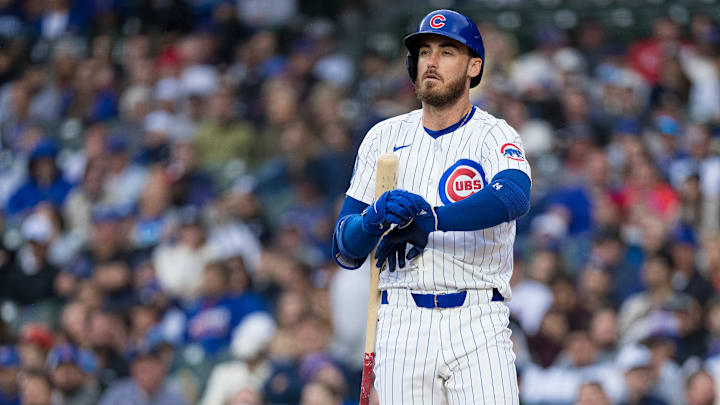After the Chicago Cubs signed Matt Boyd to a two-year, $29 million deal, I wondered how the rest of the Cubs' offseason could play out. We've heard the rumors that the Cubs are looking to trade Cody Bellinger this offseason, but I don't see the need to. Any team would be happy to save the $27 million owed to Bellinger and spend it elsewhere. Still, the problem with this Cubs roster is, where else will you spend it if you're not shopping in the deep end of free agency and have money left to spend with Bellinger already there?
As it sits, the Cubs' offense consists of:
- Miguel Amaya C
- Michael Busch, 1B
- Nico Hoerner, 2B
- Dansby Swanson, SS
- Isaac Parades, 3B
- Ian Happ, LF
- Pete Crow-Armstrong, CF
- Cody Bellinger, RF
Bench: Matt Thaiss, Alexander Canario? Miles Mastrobuoni? Luis Vazquez?
Without Bellinger, the Cubs would need to add another bat to compete in 2025. Hypothetically, let's add often-connected Pete Alonso. You're adding worse defense at first base and worse defense in the outfield by putting Suzuki back in right field. Bellinger may not hit 30+ home runs, but he hits for a higher average, plays elite defense at multiple positions, and has speed to compensate for less power. Bellinger's 2.2 WAR (Fangraphs) was lower than you'd like in 2024 but was higher than Alonso's 2.1, even with Alonso hitting 16 more homers.
The other option is to play Alonso strictly at DH in favor of Busch at first base, but convincing Alonso to sign a deal as a DH option only may not sit well with him.
So, let's keep Bellinger and his high floor locked into the lineup for now. After signing Boyd, the Cubs still have roughly $40 million before hitting the first tier of the luxury tax, which likely serves as a cap on Cubs payroll this offseason. Given that the Cubs will want money to play with at the trade deadline for an addition, let's take about eight million from that and estimate the Cubs have at least $32 million for offseason spending left at their disposal.
For more news and rumors, check out MLB Insider Robert Murray’s work on The Baseball Insiders podcast, subscribe to The Moonshot, our weekly MLB newsletter, and join the discord to get the inside scoop during the MLB offseason.
So, what could be the most realistic options for the Cubs?
With that money, they can add another starter in the price range of Jack Flaherty, Walker Buehler, or Shane Bieber, as well as a closer. Closers are a bit pricier these days, but contract structuring would be critical, with the first year of someone's deal being a bit lower than the second for luxury tax purposes. If you can get creative, it works without having to move Bellinger.
For the sake of having names, let's go with Buehler in the hypothetical sense. You have a strong rotation of Steele, Imanaga, Buehler, Taillon, and Boyd. This moves Assad to the bullpen, where he has been efficient.
I've heard from people that the Cubs "need to spend on bench bats," which costs money, too. Truthfully, the options laid out above may not be the very best, but it's what the Cubs have to work with if they want to get as competitive as possible.
Spending money in free agency to bench someone will not help the team get back to the playoffs. Suppose guys like Luis Vazquez, Miles Mastrobuoni, and Alexander Canario aren't part of the team's future. In that case, you aren't as worried about them getting at-bats daily as you are for top prospects Matt Shaw, Owen Caissie, Kevin Alcantara, and James Triantos.
This option, of course, is only if the Cubs tackle all their offseason necessities via free agency. They could still look to the trade market to add a starter, which then saves money in itself. That's the most innovative option, but it is easier said than done, especially when you aren't exactly sure which prospects you covet more than others. If you want more time to evaluate your guys at Triple-A, then spending for a starter and closer is the way to go. They have enough cash to win the NL Central while keeping Bellinger on the books.
